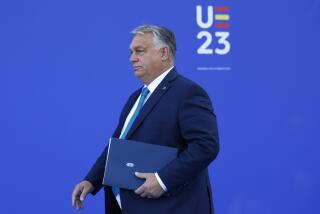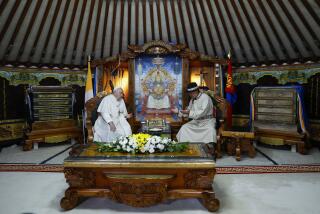At Close of Baltic Tour, Pope Urges Forgiveness : Religion: John Paul again turns to theme of reconciliation as he ends visit to ex-Soviet Union.
- Share via
TALLINN, Estonia — Communism is dead, and on his first visit to the former Soviet Union a Polish pontiff might have danced in its ashes. Instead, Pope John Paul II told victims and oppressors to sweep them away together as partners.
The Pope ended a weeklong Baltic tour in the blustery Estonian capital Friday the same way he began it in Lithuania--calling for forgiveness and reconciliation after half a century of Soviet occupation.
Time and again, in 28 speeches in half a dozen languages, John Paul unreservedly condemned communism. With marvel, he spoke of the collapse of “the rock-solid system” of Communist power. “Who could have foreseen, just a few years ago, such an event?” he said. “It is a change that had something of the miraculous, in which it is difficult not to see the hand of God.”
Yet he was careful never to sound triumphant. To winner and loser he appealed, against the current in this region, for joint moderation and reconstruction.
“What is good is not always easy,” the Pope reminded Latvians in a farewell address in Riga on Friday before the brief flight north to Tallinn.
From people in the three countries who profited from the Communist years, John Paul asked contrition and conversion. From those who suffered, he called for a “renewed faith in the power of love” that requires rejection of “the temptation of vengeance, which always leads into useless labyrinths of hatred.”
The phoenix that John Paul seeks for the Baltic countries, his own Poland and the rest of newly free Eastern Europe is democracy--with a difference.
“Happiness cannot be found by those who, looking only to themselves and listening to the messages of false prophets, set off on the road leading to consumerism, to moral permissiveness, to lifestyles which indulge selfishness, to religious indifference,” he told young people in Lithuania.
Democracy without firm moral foundations risks being as illusory and destructive of human dignity as communism was, John Paul told intellectuals in Riga.
Like the elected leaders of countries that won their independence from the Soviet Union only two years ago, the Pope recognizes that winning a revolution is easier than making the revolution work.
Lennart Meri, Estonia’s president, brought the point home eloquently Friday in welcoming John Paul to the ethnically troubled seaside nation of 1.6 million.
“The older generations have carried the light of hope and freedom in their hearts through decades of darkness, and have thus encouraged us forward,” Meri said. “Now they have a bitter taste of being swept aside like faded autumn leaves.”
Meri complained to the Pope about the 6,000 Russian troops still garrisoned in Estonia. The last Russian soldiers left Lithuania on the eve of the pontiff’s arrival there last week, but some 16,000 troops remain in Latvia.
“World War II and its aftermath is still a reality in Estonia,” Meri told John Paul. “If the world in its cozy selfishness tries to turn a blind eye to this fact, it may gain a trouble-free afternoon, but it will be at the price of a troublesome future. Our world is indivisible, just the same as morals and ethics are indivisible.”
The Pope did not address the troop issue directly during his Baltic swing, although he has said he supports withdrawal as a matter of international law.
At the risk of discomfiting his Estonian hosts, John Paul renewed his defense Friday of the rights of large Russian minorities that claim discrimination here and in neighboring Latvia.
Venturing anew into a prickly thicket, the Pope reminded leaders of Estonia’s cultural community that “respect for the language and culture of diverse social groups is an essential condition for an ordered, peaceful coexistence.”
Tens of thousands of Estonians were deported following Soviet annexation in 1940, and large numbers of Russian settlers, officials and soldiers were moved in to implement Soviet development policy. Today, nearly 40% of Estonia’s population--around 600,000 people--are ethnic Russians blindsided by overnight independence. Many of the Russians do not speak Estonian and have historically looked to Moscow as the source of their culture and leadership.
Citizenship in independent Estonia, a measure of ethnic hostilities, is automatic only for those whose families lived here before annexation. Others seeking citizenship must pass a language exam.
“It is a matter of cultivating what is distinctive without forgetting what unites human beings,” John Paul cautioned Estonians on Friday.
More to Read
Sign up for Essential California
The most important California stories and recommendations in your inbox every morning.
You may occasionally receive promotional content from the Los Angeles Times.













